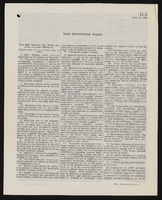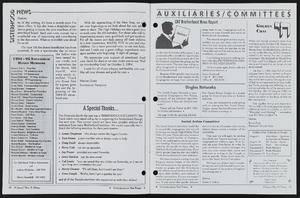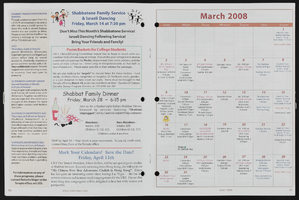Search the Special Collections and Archives Portal
Search Results
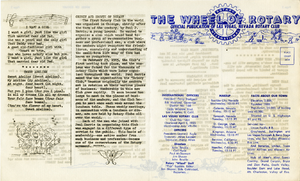
The Wheel of Rotary Las Vegas Rotary Club newsletter, October 13, 1949
Date
Archival Collection
Description
Text
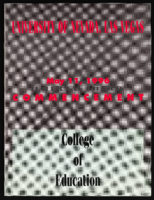
University of Nevada, Las Vegas (UNLV) College of Education 33rd commencement program
Date
Archival Collection
Description
Commencement program from University of Nevada, Las Vegas Commencement Programs and Graduation Lists (UA-00115).
Text
Jackie Appledorn oral history interview
Identifier
Abstract
Oral history interview with Jackie Appledorn conducted by Patricia van Betten on January 30, 2007 and June 26, 2010 for the History of Blue Diamond Village in Nevada Oral History Project. Appledorn discusses the history of Blue Diamond Village, from it being a stop on the Old Spanish Trail to its expansion to a family town.
Archival Collection
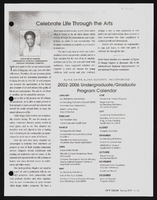
Alpha Kappa Alpha Sorority Ivy Leaf article
Date
Archival Collection
Description
From the Alpha Kappa Alpha Sorority, Incorporated, Theta Theta Omega Chapter Records (MS-01014) -- Chapter records file.
Text

Transcript of interview with Della Mae Rostine by Irene Rostine, October 31, 1991
Date
Archival Collection
Description
Della Mae Rostine left Missouri with her husband, Rocco, in 1942, and headed to Las Vegas. Happy to leave behind the hard life and instability the mining industry had to offer, after living in Las Vegas for the first year the couple settled in Henderson, Nevada, known as the townsite at that time. Della Mae’s oral history provides readers with a glimpse of what life was like for the 14,000-plus individuals and families who also moved to southern Nevada during the same period in order to make a living in the growing “war work” industry the area had to offer. Della Mae shares the hardships faced in finding housing, especially for families with children. She discusses challenges ranging from securing home furnishings to purchasing groceries, including the rations on gasoline and butter at that time. Della Mae also discusses her experiences with the Basic Magnesium plant where her husband was hired as a construction worker in the early days of the plant and where she would work briefly as a machinist making shell casings and monitoring the down time on the production line. She also touches briefly on the social opportunities the BMI plant, and later Rheem Manufacturing, offered to the workers and their families. When World War II ended, more than half of residents of the townsite left, leaving fewer than 7,000 people to form what would later become the city of Henderson, Nevada. Della Mae’s oral history is a brief overview of a family life which began when BMI was just getting off the ground and continued through the many changes that took place in the BMI complex and the town site over several decades. The timing of the Rostine family’s arrival and the fact that they stayed and made a permanent home in Henderson led to their designation as one of Henderson’s “founding families.”
Text

Transcript of interview with Susan Jones Watson by Claytee White, February 20, 2013
Date
Archival Collection
Description
A resident of Southern Nevada from the age of three, Susan Watson shares her memories of growing up and living in Las Vegas. After a year in Boulder City, Susan's father bought an old army barrack and converted it to a home in North Las Vegas; Susan remembers playing in the desert with her siblings and attending elementary and middle school before starting at Rancho High. Watching her mother design costumes for Strip performers and beautiful dresses for her own high school dances no doubt helped Susan develop her own sense of taste and style - something that she would put to good use over many years as an interior designer. Before that though, Susan shares her memories of what life was like in the Las Vegas of the 1950s and 1960s: cruising Fremont Street; movie nights; after-school work; favorite teachers; lunches on the lawn; and dance club. All combine to paint a vivid picture of a smaller town and a simpler time in the Las Vegas valley.
Text

Transcript of interview with Harriett Thornton Hicks by Claytee D. White, October 28, 2009
Date
Archival Collection
Description
Harriett Thornton Hicks was born June 8, 1913,in Parowan, Utah; the thirteenth child of 14. She tells of her pioneer family who dwelled in two log cabins—one for cooking and one for sleeping. In 1931, she moved to Las Vegas to join two older sisters who had relocated here. She was picked up at the train by young Charles Hicks, who was a friend of her sisters. Charles had a car and offered to provide transportation. Within three years, the two were married. She quit her drug store job to raise a family and he worked for the railroad, the only business at the time in Las Vegas. At the age of 96, Harriett recalls a range of community milestones, such as the Boulder Dam, the news of Pearl Harbor bombing, Fremont Street, the Biltmore Hotel, and how to live in a city with mob influences.
Text

